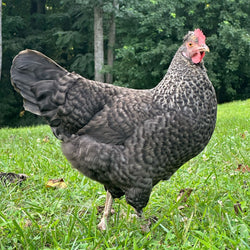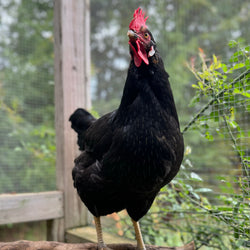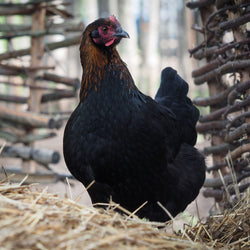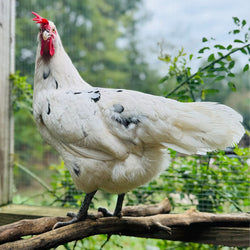f=menu&page=5/--
Frequently Asked Questions
Here we answer the most commonly-asked questions about ordering, chicken care, and more.
I got a terrible hatch. Does that mean most of my eggs were infertile?
No, a terrible hatch doesn't mean that most or even any of your eggs were infertile! They may all have been fertile. Remember, just because an egg doesn't hatch (or even if it doesn't develop), that doesn't mean it wasn't fertile. It is not possible to see the fertilized blastodisc, or blastoderm, on the yolk of the egg after 21 days of incubation, as it will have deteriorated by then. �If you have a rooster with your hens, you can presume good fertility up to about a ratio of ten or twelve hens to every rooster. To check your exact...
Read MoreHow large are chickens?
Chickens can vary in size greatly by breed and variety! Large fowl cochin beside bantam cochin Large fowl chickens can range from 4 pounds for small hens to nearly 15 pounds for the largest roosters! Bantams vary in size, too. They can weigh from a few ounces for the tiniest seramas to more than two pounds for larger bantams. Generally speaking, bantam versions of large fowl breeds tend to be 1/3 to 1/2 the size of the larger birds.
Read MoreI want to get a chick for Easter for my son's basket, and then find a farmer to adopt it when it has grown. How do I do that?
No, no, no... you don't want to do that. It's is a bad idea for many reasons. First, one chicken raised alone will often die of loneliness--they are flock animals and need companions. Second, baby chicks require a nice warm brooder--and by warm, we mean about 95 degrees! They will get ill and die at room temperature in an Easter basket. And third, even were you to buy several chicks and give them proper care in a brooder, generally speaking, it's still just not an ethical thing to do. It's cruel to raise a baby animal, or several, only to...
Read MoreWhy are my chickens molting late, and how can I help them stay warm?
Chickens molt annually, usually in the fall. But some chickens do molt later than others. Often this varies by breed as well as the conditions under which they live. Reasons your chickens may be molting late in the year: Your chickens begin molting when their bodies tell them it is time, and that is usually based on daylight hours. Decreasing day length is the normal trigger. Birds start at the end of August or beginning of September, while other breeds may wait until November or December. Adding light to their coop: Some people add light to keep their birds laying consistently...
Read MoreShould I add light to my coop during the winter?
You don’t have to use light at all. However, if you’d like to encourage egg production during winter’s shorter days, the good news is you don’t need anything too bright!
Read MoreWhy do my baby chicks poo so much?
Your baby chicks poo so much because they have to eat a lot to grow as fast as they do! Remember, they are going from egg-sized (2 ounces or so) to chicken-sized (8 pounds or so) in just a few months, and that takes a lot of energy and food. Imagine how much baby humans would eat if they grew into teenagers in just a few months! Since lots of eating means lots of pooing, baby chicks do poo a lot. It's important to keep their area clean so they will grow up healthy and strong.
Read MoreWhich chicken breed has the quietest, tamest roosters?
Unfortunately, there is no pat answer on this one. First, ALL roosters crow. We happen to love the sound (to us it's far preferable to yapping dogs or leaf blowers!). However, it is not possible to know which roosters will crow often and which will be quieter than others when they are baby chicks, just as it's not possible to know which dogs will be barkers when they are pups. With roosters, a lot will depend on their environment too, and how safe they feel "their" hens are. If your chickens are in an area where they are constantly molested...
Read MoreWhy does my hen hop off of the nest, then toss hay, grass, and leaves over her shoulder and back?
We LOVE it when they do that... it's so darn cute! This is a nesting behavior. Hens that are broody will often do this when settling into the nest, and occasionally hens who are not broody will do it before or after laying. In nature, having little bits of the surrounding grass, leaves, and other detritus covering her would help to keep her camouflaged from predators by breaking up her silhouette.
Read More







"The Clubhouse" Coop
Easy to assemble and built to last, the Clubhouse Coop is the perfect starter coop for a small flock.











